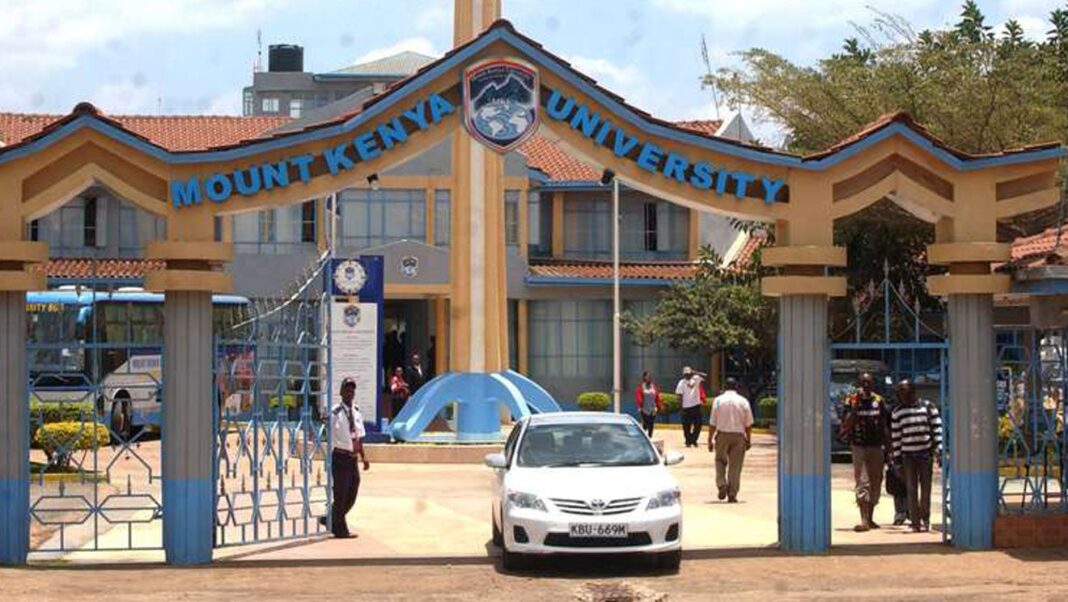Outrage as MKU’s controversial policy demands entire academic year repetition for failing non-core Human Communication and Medical Ethics unit despite excelling in critical medical subjects
Mount Kenya University is facing fierce criticism over a controversial academic policy that forces second-year medical students to repeat an entire academic year worth Sh510,000 if they fail just one unit – Human Communication and Medical Ethics – despite passing all other subjects, including core medical units.
The policy has ignited fury among affected students and their families, who describe it as calculated financial exploitation that prioritizes profit over educational fairness and student welfare. Medical students at MKU pay Sh170,000 per trimester, totaling Sh510,000 per academic year, making this penalty a devastating financial blow for families already stretched by the six-year medical degree program costing approximately Sh3 million.
“This directive has caused great distress and is viewed by many students as a disproportionately harsh penalty,” states a formal complaint letter to Dr. Dennis Miskellah, Secretary General of the Kenya Medical Practitioners, Pharmacists and Dentists Union (KMPDU), signed by all affected second-year medical students.
The absurdity of the policy becomes clear when examining what triggers it. Human Communication and Medical Ethics, while important for professional development, is not classified as a core medical unit. Yet students who excel in critical subjects like anatomy, physiology, pathology, and other essential medical sciences are forced to retake the entire year for failing this single unit. This effectively transforms what should be focused remedial action into a lucrative half-million-shilling revenue stream for the university.
The affected students have been unequivocal in their condemnation of the policy through their formal complaint to KMPDU. While acknowledging the importance of professional conduct, communication, and ethical training in medical practice, they argue that this enforcement undermines both fairness principles and broader educational objectives.
What makes this particularly galling is how students discovered this requirement – they were simply “informed” of it, suggesting a complete lack of prior transparency about the consequences of failing this unit. The psychological toll on students is immense, with medical school already being one of the most demanding academic programs requiring years of investment and significant family resources.
Despite the gravity of these allegations and the formal complaint, Mount Kenya University has maintained a conspicuous silence. The institution has provided no public justification for the policy nor addressed concerns raised by students and their families. This silence is particularly troubling given MKU’s status as the first private chartered university to offer Bachelor of Medicine and Bachelor of Surgery, a position that should demand heightened responsibility toward student welfare.
The controversy reflects a broader malaise within Kenya’s private higher education sector, where profit motives appear to override student welfare. The policy creates a perverse financial incentive for the university to maintain high failure rates in specific units, knowing each failure translates to Sh510,000 in additional revenue.
The timing couldn’t be worse for Kenya’s healthcare system. The country desperately needs more medical professionals, yet policies like this delay the graduation of competent doctors who have proven their mastery of core medical subjects. Most reputable medical institutions worldwide implement proportionate remediation policies including supplementary examinations, targeted remediation programs, and special assessments focused on specific units rather than blanket year repetition requirements.
The economic devastation extends beyond students to their families. The additional Sh510,000 represents nearly two years’ salary for many Kenyan workers, equivalent to school fees for multiple siblings, or a substantial portion of family savings. For families who have already taken loans or sold assets to fund medical education, this burden could prove catastrophic.
Students have strategically approached KMPDU, recognizing the union as “the recognized patronage and advocate for medical students and practitioners across Kenya.” They’ve requested intervention in three areas: engaging with faculty to review the policy, advocating for fairer remediation frameworks like supplementary exams, and ensuring student voices are heard in academic decisions affecting their futures.
The students’ complaint demonstrates remarkable maturity, seeking “a just and reasonable resolution that upholds academic standards while safeguarding the rights and wellbeing of medical students.” However, KMPDU’s response remains unknown, raising questions about the union’s commitment to protecting student interests.
This controversy has become a litmus test for institutional integrity in Kenya’s private higher education sector, highlighting the urgent need for oversight mechanisms preventing student exploitation through punitive academic policies. As Kenya grapples with healthcare workforce shortages, policies that unnecessarily delay competent medical professional graduation aren’t just unfair to students – they threaten national health security.
The Commission for University Education must investigate whether MKU’s policy complies with established standards, while KMPDU must fulfill its advocacy role by pushing for reform. Most critically, Mount Kenya University must break its silence and either justify this policy or commit to reviewing it in line with student welfare considerations.
The resolution will send a clear message about whether profit or public interest takes precedence in Kenya’s medical education landscape. With the future of medical education integrity and hundreds of aspiring doctors’ financial wellbeing hanging in the balance, the medical community awaits decisive action to address this apparent injustice.


